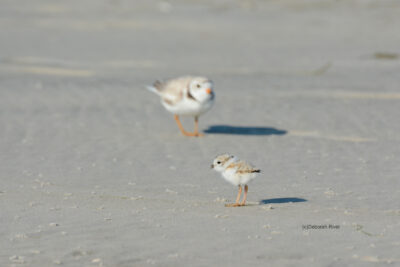
Piping Plovers are a beach bird so tiny, most people think the adult is the chick. They are an endangered species with 6000 birds left – half of whom nest on busy beaches in New Jersey. Here’s the stuff you need to know about them:
- Their nesting season starts with a taxing migration from the Bahamas or the Gulf Coast. Then a rapid search for a mate , and territory which the DEP ropes off for their safety.
- Once they find a mate, the male makes a few little shallow scrapes in the sand. The female chooses one and lays 2-4 eggs in it.
- Both parents incubate the eggs and raise the chicks.
- Excellent camo and two determined tiny parents are their defenses for keeping the family safe on the beach.
- When the chicks hatch they weigh 6 grams. Within a couple of hours they dry off and start walking, then running in all directions!
- A critical point that sets Piping Plovers apart from other shorebirds is they never bring food back to the nest. From their 2nd day, the chicks feed themselves at the shoreline, with parental supervision – and they forage and nap round the clock.
- The parents rely on being with their flightless chicks to tell them what to do when there is danger, so separating them for even a brief period may cause the chicks to be picked off by a crow or gull, or injured by someone who doesn’t see them.
- About two weeks after they hatch, Mom leaves her chicks with Dad who provides the last couple of weeks of oversight.
- At the end of about 30 days of parental oversight when the chicks have learned to fly, the father leaves his chicks on the beach, and starts his own migration south.
- The chicks leave for their first migration at about 2 months old, and will start their dangerous journey south – alone.
Wondering why dogs are not allowed on nesting beaches?
This is a really good question! If you have a gentle family dog, it probably doesn’t make sense that anything would be fearful of him. It’s helpful to remember the birds dont stay in the nest, but need to forage along the shoreline, so they are easily put into a dangerous situation. Even the sweetest dog is perceived as a fox or other predator by the birds, and his very presence on the nesting beach, on or off lead, can cause the parents to leave the chicks unattended or force them to flee. This makes the chicks especially vulnerable – and the parents have to make the choice between their chicks being able to feed or keeping them safe.
Beach-nesting birds like Piping Plovers continue to try to raise their families alongside ours in the summer but in declining numbers. With more human disturbance, and diminishing safe nesting habitat due to sea level rise, successfully raising a family on the beach is becoming increasingly difficult. But, there is hope! Given the chance, nature will improve.
How to help?
Here are a few things any of us can do to help Piping Plovers and other beach-nesting birds – and none of it is complicated!
- Respect the rules – stay out of and keep your distance from roped-off nesting areas
- Keep pets off the beach, or if permitted, leashed and away from nesting and feeding areas
- Keep vehicles off nesting beaches
- Give the birds plenty of space
- Play games, kite surf and fly drones on beaches other than nesting beaches
- Walk around, not through flocks of birds
- Clean up garbage and trash and dispose of fishing line
- Spread the word about Piping Plovers!
- Volunteer to be a beach steward
- Bring Binoculars and show people how amazing these birds are!